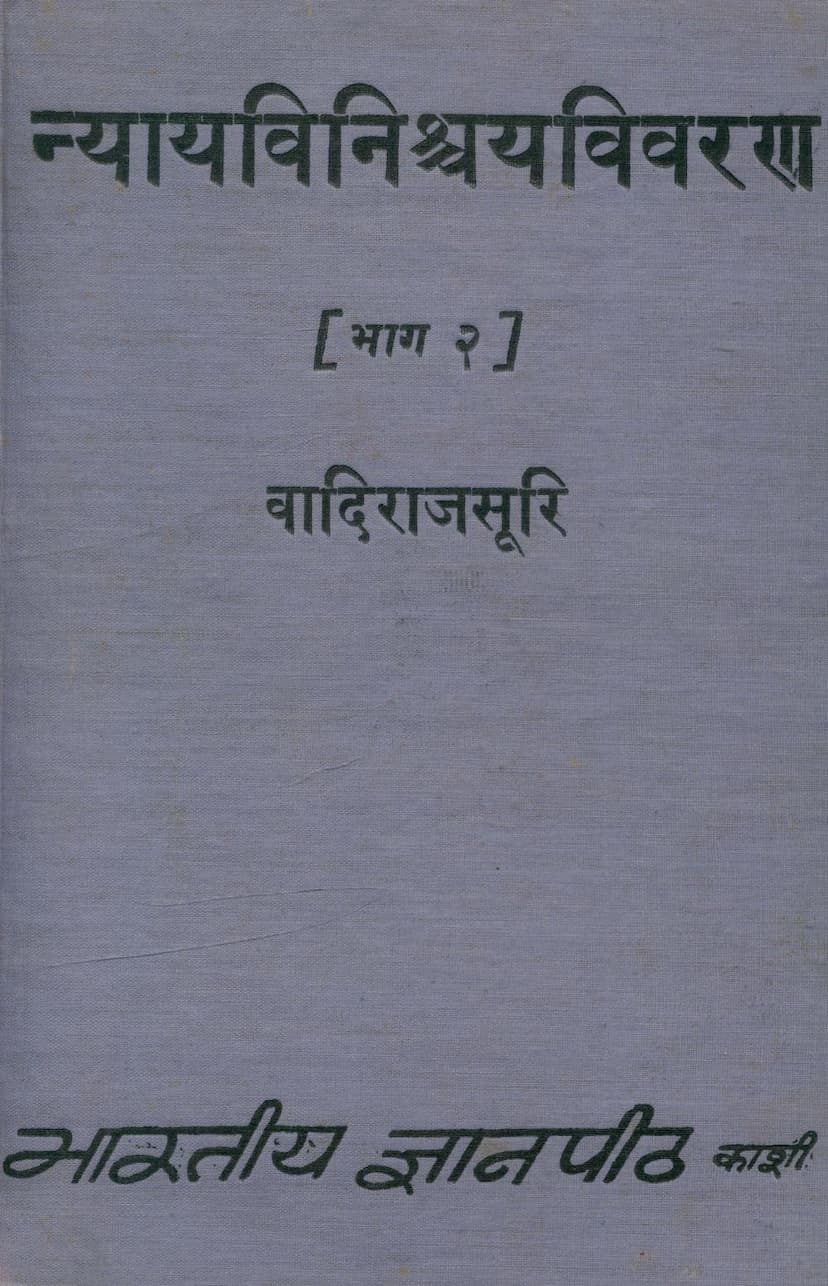Nyayvinischay Vivaran Part 02
Added to library: September 2, 2025

Summary
This document is Volume II of the Nyayavinischayavivarana, a significant commentary on Bhaṭṭa Akalanka's Nyayavinischaya. The original work, Nyayavinischaya, is a foundational text in Jain epistemology and logic, while this Vivarana (commentary) is authored by the renowned Jain scholar Shri Vadīraja Suri. The publisher is Bharatiya Gyanpith, and this particular volume, published in September 1954, focuses on the Anumanapravachana (Discourse on Inference).
Here's a breakdown of the key aspects covered in this volume based on the provided text:
Core Subject Matter:
- Commentary on Jain Logic: The primary purpose of the Nyayavinischayavivarana is to elucidate and elaborate upon the logical principles established by Bhaṭṭa Akalanka. This volume specifically delves into the topic of Anumana (Inference), a crucial pramana (means of knowledge) in Indian philosophy, particularly within the Jain tradition.
- Critique of Other Philosophical Schools: As is common in Indian philosophical commentaries, this work engages in detailed critique and refutation of the logical tenets and theories of other contemporary schools of thought, most notably Buddhism (especially the doctrines of Dharmakirti and his exponents like Prajñākaragupta) and also touches upon Charvaka and Samkhya viewpoints.
Key Themes and Arguments (Anumana - Inference):
The table of contents and the introductory sections highlight the following key areas of discussion within the volume:
- Definition and Nature of Inference (Anumana): The text likely starts by defining inference and its role as a valid means of knowledge, distinguishing it from other pramāṇas.
- The Role of 'Sādhya' and 'Vijñāna' in Inference: The commentary examines the significance of terms like 'sādhya' (the predicate to be proved) and 'vijñāna' (knowledge) in the definition of inference.
- The Validity of Inference: Discussions likely revolve around establishing the validity of inference, especially for inferring unperceived realities.
- Critique of Buddhist Theories: A significant portion is dedicated to analyzing and refuting Buddhist theories of inference, particularly those presented in Dharmakīrti's Pramāṇavārttika and Prajñākaragupta's Pramāṇavārttikālaṅkāra. This includes discussions on concepts like:
- The Tri-rūpa Hetu (Three-limbed Probans): The text scrutinizes the Buddhist doctrine of the syllogism requiring three characteristic marks (hetu, sādhya, and dṛṣṭānta) for valid inference.
- Hetvābhāsa (Fallacies of Inference): The work likely details various logical fallacies identified by different schools and refutes them from a Jain perspective.
- The Nature of Causality and Its Relation to Inference: The Jain understanding of cause and effect, and how it underpins inferential knowledge, is likely explored.
- The Concept of 'Anyathānupapatti' (Non-perversion/Non-fallaciousness): This fundamental Jain logical principle, crucial for establishing the connection between the probans and the probandum, is a central theme.
- The Nature of 'Sāmānya' (Generality) and Its Role in Inference: The Jain concept of generality, often understood in relation to "sadṛśa-pariṇāma" (similar transformation), is likely contrasted with Buddhist theories of generality.
- Specific Topics of Discussion: The table of contents reveals a wide range of specific logical arguments and counter-arguments, including:
- The nature of language and its relationship to meaning (sabda-artha sambandha).
- The validity of 'Jati-smaraṇa' (remembering past lives) as a form of knowledge.
- The debate on the nature of 'Chaitanya' (consciousness) – whether it's a bodily quality or inherent to the soul.
- The refutation of various metaphysical theories like the Samkhya's 'Pradhana' and the Buddhist doctrine of 'Kṣaṇabhanga' (momentariness).
- Discussions on the validity of 'Anupalabdhi' (non-perception) as a means of knowledge.
- The critique of the Buddhist concept of 'Anyapoha' (exclusion) regarding universals.
- The comprehensive analysis of the concept of 'Sarvajñatva' (omniscience), a key Jain tenet, likely including arguments for and against it, drawing from both Jain and Buddhist perspectives.
Significance of the Work:
- Preservation of Jain Logic: This volume represents a vital contribution to the preservation and understanding of classical Jain logical thought.
- Scholarly Editing: The editing by Prof. Mahendra Kumar Jain, a renowned scholar in Jain Nyaya, is highlighted as a significant achievement, bringing a complex and ancient text to the scholarly world with accuracy and clarity.
- Comprehensive Analysis: Vādirāja Suri's commentary is noted for its elaboration, exhaustiveness, and comprehensive treatment of problems that were central to Indian logic, including detailed critiques of Buddhist philosophers like Dharmakirti.
In essence, Volume II of Nyayavinischayavivarana is a deep dive into the intricacies of inferential reasoning from a Jain philosophical standpoint, engaging rigorously with opposing views and establishing the logical framework of Jainism.